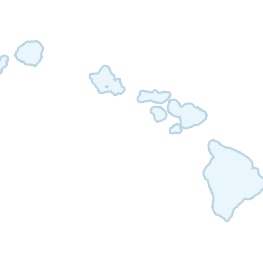Key Takeaways
- Medicare in Hawaii is health insurance for all Americans aged 65 and older. You must be a U.S. citizen or have been a legal resident for five or more years.
- Original Medicare (Parts A and B)Original Medicare is a fee-for-service health insurance program available to Americans aged 65 and older and some individuals with disabilities. Original Medicare is provided by the federal government and is made up of two parts: Part A (hospital insurance) and Part B (medical insurance). provide some hospital and medical coverage. Medicare AdvantageMedicare Advantage (Medicare Part C) is health insurance for Americans aged 65 and older that blends Medicare benefits with private health insurance. This typically includes a bundle of Original Medicare (Parts A and B) and Medicare Prescription Drug Plan (Part D). in Hawaii bundles the coverage you’d get from Parts A and B with Part DMedicare Part D is prescription drug coverage for people enrolled in Medicare. Part D is optional and is offered by private insurance companies. and other services.
- The standard costs of Medicare are affected by details like income and work history.
Medicare isn’t a single program, but several different parts are designed to provide the health coverage you need. To get a plan that fits you, you’ll need to understand some key points. For example: Do you know which Medicare plans in Hawaii are available? Do you know how much they cost or when to enroll? Can you purchase Medicare Advantage in Hawaii?
To help answer questions like these, say aloha (the hello one) to GoHealth’s guide to Medicare in Hawaii.
How Do I Apply for Medicare in Hawaii?
You can first sign up for Medicare during your Initial Enrollment Period. If you’re approaching the age of 65, there are several ways to enroll through the Social Security Administration (SSA).
- Online on the SSA website.
- In person at your nearest SSA office.
- Call the SSA at 1-800-325-0078.
- Through the Railroad Retirement Board (RRB); if you worked for a railroad, you may need to enroll in Medicare in Hawaii through the RRB. Call the RRB at 1-877-772-5772.
- Call a GoHealth licensed insurance agent. They can review your options and help you enroll in a plan that fits your needs.
When to Enroll in Medicare
Starting with your Initial Enrollment Period, there are designated times to sign up for and change your Medicare coverage. These are known as enrollment periods. Here are the dates to keep circled on your calendar:
- Initial Enrollment Period (IEP): Seven months around the month you turn 65. If your birthday is in June, your IEP opens March 1 and closes September 30. Missing your IEP can leave you with costly enrollment penalties.
- Medicare’s Open Enrollment Period: October 15 to December 7
- General Enrollment Period: January 1 to March 31
- Medicare Advantage Open Enrollment Period: January 1 to March 31
Get real Medicare answers and guidance – no strings attached.
Does Medicare Cover Me in Hawaii?
To be eligible for Medicare in Hawaii, you typically must be at least 65 years old and a U.S. citizen or a legal resident for five or more years.
There are some situations in which you may be eligible before 65, including:
- You’ve drawn disability-based Social Security benefits, or Railroad Retirement Board (RRB) benefits, for 24 months.
- You’re living with end-stage renal disease.
- You’re living with amyotrophic lateral sclerosis (ALS), also called Lou Gehrig’s disease.
What Are the Types of Medicare?
Medicare Parts A and B combine to make up Original Medicare. Original Medicare beneficiaries also must enroll separately in Part D to receive prescription drug coverage. Medicare Advantage is a substitute for Original Medicare that provides coverage to match Parts A and B, usually bundling Part D and additional benefits.
Medicare Supplement Insurance, or Medigap, can also be a valuable resource for Hawaiians. Original Medicare in Hawaii can come with high out-of-pocket costs, including copayments, coinsurance and deductibles. Medigap plans help cover these costs. Like Part D, Medigap must be added separately.
Your Ideal Medicare Plan is out there.
Who Qualifies for Medicaid in Hawaii?
Medicaid is not the same program as Medicare. The state partially provides Medicaid. Eligibility is based on income and family size. Check with the State of Hawaii to see if you’re eligible for Medicaid.
Does Hawaii Have Medicare?
You can choose from Original Medicare and Medicare Advantage plans in Hawaii. Because Medicare is a federal program, eligible residents in all states and Washington D.C. can enroll.
Is Medicare Free After You Turn 65?
Chances are, you’ll have to pay something for your health care after you turn 65. While many people believe the myth that Medicare is provided at no cost when they turn 65, there are several fees you’ll want to know about. Also, keep in mind that while some costs are standardized, what you’ll end up paying will come down to your needs, income, and which plan you choose.
In other words, you’re going to want to budget for Medicare in Hawaii. To help you get started, here’s what you can expect to pay for Original Medicare (Parts A and B) in 2024.
Medicare Part A
Premium:
- $0 if you or your spouse worked 10 or more years
- $278 a month if you worked between 7.5 and 10 years
- $505 a month if you worked fewer than 7.5 years
- $1,632 for each hospital benefit period
- Hospital stays: $0 copay for Days 1-60 following deductible payment; daily charges for Days 61 and after
- Skilled Nursing Facility: $0 for Days 1-20 (each plan period); daily charges for Days 21 and after
Medicare Part B
Premium:
- $174.70 monthly and up (income-based)
- $240 for each plan period
- Most preventative services: $0
- Medicare-approved services: 20% coinsurance
Can I bundle multiple benefits into one plan?
What Is the Average Cost of a Medicare Part D Plan?
Part D monthly premiums vary in cost with a projected average of $55.50 in 2024. This monthly premium is just one of the costs associated with Part D you’ll need to know about. Here’s a quick breakdown:
PART D PREMIUM
- Based on plans and beneficiary needs
- Income-based if a member qualifies for Low-Income Subsidy benefits
- Varies by plan; capped at $545 in 2024
- It depends on plan and medications needed
How Much Money Can You Have and Still Get Medicare?
Unlike Medicaid, you don’t have to have a low income to qualify for Medicare. That means it doesn’t matter how much money you make; you can still enroll in Medicare in Hawaii. Your income may raise some of your costs, however, especially with Original Medicare and Part D.
If you have trouble affording your Medicare costs, there may be help. Medicare Savings Programs can help you pay for your out-of-pocket costs from Part B. If you need prescription drugs the Low-Income Subsidy, or Extra Help, may be able to provide financial assistance.
To see what cost-saving programs your state has to offer, give GoHealth a call. Our licensed insurance agents will review your qualifications and see if there are options that fit your needs — and your budget.
What is the Best Medicare Plan?
The answer here totally depends on what you need from a plan. Deciding between the different Medicare plans in Hawaii is a personal process, and you’ll want to consider several factors. In other words, picking a plan based on what someone else thinks is “best” can leave you without the right coverage and services. Instead, are some tools to help find a plan that works for you:
- Assess your needs and plan ahead with our Enrollment Checklist.
- Want little-known Medicare pointers? Check out our Pro Tips page.
- Weighing Original Medicare vs. Medicare Advantage in Hawaii? Learn their Pros & Cons.
- See what others think of their plans with the Medicare Star Ratings.
- Get impartial and honest guidance from a GoHealth licensed insurance agent.
Which States Have the Best Medicare Advantage Plans?
The enrollment numbers for Medicare Advantage in Hawaii are often among the highest in the country. However, that fact doesn’t matter if you don’t find a Medicare Advantage plan that fits your needs and budget. Rather than seeing what others think is best, it’s more helpful to come up with your list. To help, here are the different kinds of Medicare Advantage in Hawaii and the differences between the plan types.
- Health Maintenance Organization (HMO) plans provide a network of doctors and providers you can see, and your care is managed by a primary care physician.
- Preferred Provider Organization (PPO) plans use primary care physicians but allow flexibility to see doctors outside your network.
- Private Fee-for-Service (PFFS) policies provide separate payments to your providers for each service you receive.
- Special Needs Plans (SNP) are designed for patients living with certain diseases or health conditions. D-SNP plans assist dual-eligible individuals; C-SNP are for patients with chronic diseases.
Thousands of older adults enroll in Medicare every day across the United States. The latest CMS data shows that 248,113 people are enrolled in Medicare Part A and B in Hawaii. The total number of beneficiaries enrolled in Medicare Advantage increased from 131,138 to 137,938 year over year. Medicare Advantage participation in Hawaii went from 54.25% to 55.59% year over year. If you’d like to dive deeper into how Medicare in Hawaii breaks down across the state, we provide a glance at who is using Medicare and how.

248,113 Beneficiaries with Part A & Part B
137,938 Medicare Advantage Beneficiaries
55.59% Medicare Advantage Participation Rate
52.59% Female
47.41% Male
32.30% Non-Hispanic White
1.14% African American
5.80% Hispanic
60.75% Other/Unknown
11.11% Eligible for Medicaid
0.92 Average HCC Score
$8,113.78 Actual Per Capita Costs
15.12% Hospital Readmission Rate
21.56% % of Beneficiaries with an Emergency Department Visit
131,138 Medicare Advantage Beneficiaries, Previous Year
Increased Medicare Advantage, Year over year
54.25% Medicare Advantage Participation Rate, Previous Year
Table reflects the latest Beneficiary Demographics Data: Medicare Geographic Variation – by National, State & County
Average HCC Score: The Hierarchical Condition Category score gauges a population’s overall health. The score is based on a value of 1.0. Populations with an HCC score of less than 1.0 are considered relatively healthy. The score can be used to estimate health costs.
Hawaii Aging and Disability Resource Center (ADRC)
https://www.elderlyaffairs.com/
What should I know about the Hawaii ADRC?
Programs and resources for seniors, caregivers and the disabled. These can include adult day care, transportation, and much more.
Hawaii Med-QUEST
1-800-316-8005
1-800-603-1201 (TTY)
https://medquest.hawaii.gov/
What should I know about the Med-QUEST?
Hawaii’s Medicaid program for adults, children and families with limited resources and low income
Hawaii State Health Insurance Assistance Program (SHIP)
1-888-875-9229
1-866-810-4379 (TTY)
https://www.hawaiiship.org/
What should I know about the Hawaii State Health Insurance Assistance Program?
See if you can lower your out-of-pocket costs with Hawaii’s Medicare Savings Program
Hawaii Office of Veterans’ Services
https://dod.hawaii.gov/ovs/
What should I know about the Hawaii Office of Veterans’ Services?
File appeals, connect with your benefits, and find information on other services and activities
Nationwide Resources
Speak with a GoHealth insurance agent that is licensed in Hawaii about your Medicare questions.
Mon – Fri, 8 a.m. – 6 p.m. CT
Centers for Medicare and Medicaid Services
You can reach the Social Security Administration by phone for general questions. Not all questions can be answered over the phone.
Also, SSA.gov provides online resources for the following: Review information, apply for benefits, or manage your account online
1-800-722-1213
TTY 1-800-325-0778
Speak to SSA Representative, Monday – Friday, 8 AM – 7 PM ET
Medicare Learning Guides
Healthcare is personal. So is choosing insurance. If you are new to Medicare, a beneficiary researching options, or a caregiver, we have tailored Medicare Guides for you.

Before 65 Guide
Understanding health insurance before age 65, especially when considering early retirement

Medicare Plans Guide
Costs, coverage and enrollment details for each Medicare plan

Medicare Beneficiary Guide
For those currently enrolled in Medicare

Low Income and Medicare Guide
For individuals with a qualifying income status

A Caregiver's Guide
For individuals with a qualifying income status
Sources
- Medicare costs at a glance. Medicare.gov.
- Yearly deductible for drug plans. Medicare.gov.
This website is operated by GoHealth, LLC., a licensed health insurance company. The website and its contents are for informational and educational purposes; helping people understand Medicare in a simple way. The purpose of this website is the solicitation of insurance. Contact will be made by a licensed insurance agent/producer or insurance company. Medicare Supplement insurance plans are not connected with or endorsed by the U.S. government or the federal Medicare program. Our mission is to help every American get better health insurance and save money.
Any information we provide is limited to those plans we do offer in your area. Please contact Medicare.gov or 1-800-MEDICARE to get information on all of your options.


